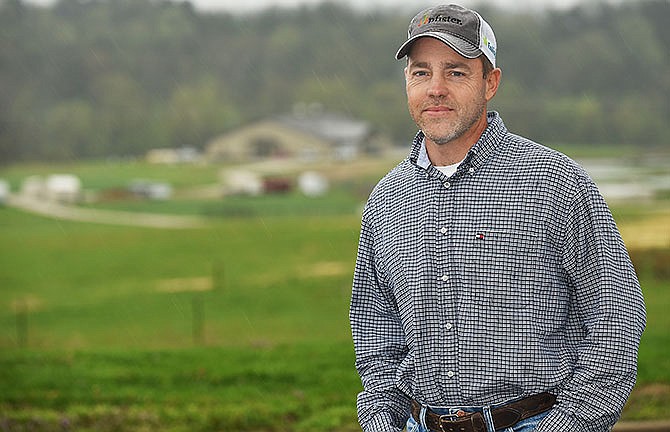In the rural town of St. Thomas, farming was the lifeline of Jeremia Markway and his family. His grandpa ran a dairy farm there, and his dad raised cattle and horses.
The family's agricultural pursuits influenced Markway at a young age to become a farmer.
"It's always been part of my life," he said. "I knew when I was 5 years old that I wanted to farm one way or another."
To show his support, Markway's father gave him a twin set of calves around age 12. It was a token of appreciation for his help running their family farm. Markway said he sold the calves and bought more, kicking off his business endeavors in the industry. His interest remained solid throughout his years at Eldon High School, propelling him to earn a bachelor's degree in plant science and minor degrees in animal science and agriculture economics at the University of Missouri.
Markway, 42, now runs a family farm in Eldon, where he raises beef cattle, hair sheep and quarter horses, with his father and brother-in-law.
Since 2012, Markway has been sharing his passion and knowledge for farming with Lincoln University students and the public as the university's farm superintendent.
He manages the 160-acre George Washington Carver Farm and the 320-acre Freeman Farm. Markway and his team prepare the land and land animals for principal investigators' research studies.
He said there are 125 sheep, 100 nanny goats and 50 cows on the properties.
Current Lincoln research being conducted at the farms includes: genetic selection test for parasite resistance in meat goats, carcass quality and feed lot studies in goats, integrated pest management with Japanese beetles and other insects, plant pathology, aquaculture research, vegetable and crop variety trials, hydroponics, cover crops and biochar.
Last year, Markway said more than 5,000 people came through the multi-purpose building, which he and his team operate, giving them the chance to be a face for the university. They hosted a 4-H practice judging contest that attracted more than 1,000 students, an elementary school field day, a vegetable field day and sheep sheering school.
Markway said it's important for the public to understand the Lincoln farms are a hub for education. Private farmers are always welcome to come and see how Carver and Freeman farms are managed in order to replicate techniques on their own farms.
"I get to do what I enjoy in a way that I'm still farming here," he said. "I love to learn, and I like to help people learn. This job allows all that to be wrapped up in one."
Markway hopes to also pass on his passion for farming to the next generation in his family. He has three daughters - Macy, 13, Jada, 10, and Logan, 18 months.
"Our hope is that 100 years from now it's still in our family. ... We want to manage it for future generations of our family, whether it's a daughter of mine or one of my nephews or nieces," he said.
Sometimes in the agricultural industry, Markway said, too much focus is put on dollars and cents when farmers are solely interested in land value. For Markway and his family, it's about much more than that. He leads his life by three principles: faith, family and farming.
"To me, it's about being a good steward," Markway said. "God's given us this opportunity, so it's about being a good steward and taking care of it and showing what we can do with it."

